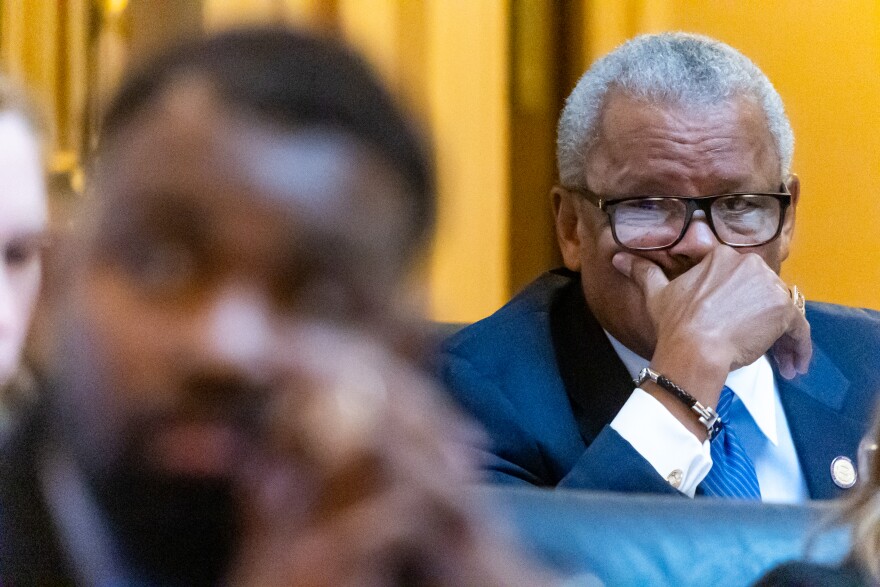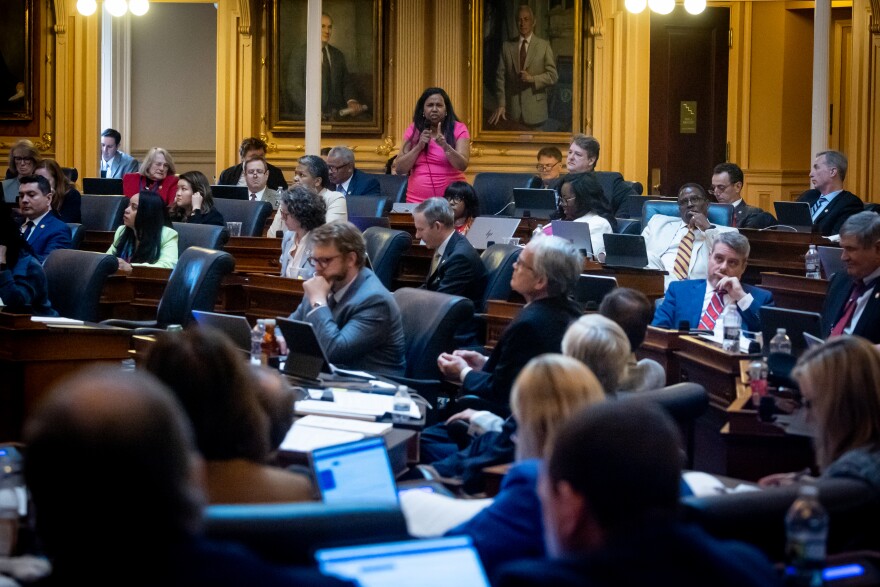The House and Senate largely stuck to the legislation and budget they passed in February, as lawmakers reconvened in Richmond to consider hundreds of vetoes and amendments from Republican Gov. Glenn Youngkin.
Dozens of Youngkin’s amendments made technical fixes or clarified language after policy and legal staff reviewed the more than 900 bills the General Assembly passed. All in all, there were about 300 bills for lawmakers in the Democrat-controlled chambers to consider overriding or further amending.
On bills where there were policy differences, generally there was not big overlap in how Democrats and Republicans voted on the governor’s amendments. But House Republicans voted to pass original forms of four bills dealing with maternal health.
All 100 seats in the Virginia House of Delegates are up for election this fall, which puts the votes and comments of those running for reelection under extra scrutiny.
By the time the Legislature adjourned late Wednesday, they had only accepted a few dozen budget amendments too.
“We were not going to allow the governor to to basically shift money away from the priorities that Democrats had demonstrated when we passed a budget back in February,” said state Sen. Mamie Locke (D–Hampton).
Bills with rejected amendments now return to Youngkin, who can decide whether to veto or sign bills, and he can veto budget items.
In a press release, Youngkin did not elaborate on specific actions taken by the statehouse.
“I am grateful to all our legislators, who dedicate their time and energy to serving the people of Virginia,” he said. “Over the next 30 days I will review and take final action on the bills and budget amendments that have been sent back to my desk.”
Budget
Legislators largely rejected changes Youngkin recommended for the compromise budget they passed in February, including making two tax cuts affecting primarily lower income Virginians permanent.
It leaves the governor a package of budget amendments similar to the one passed by the General Assembly to consider, but adjusted for Youngkin’s vetoes. He will now be able to veto items that include his recommendations that legislators didn’t agree to.
The February compromise budget, known as the conference report, contained over $1 billion in tax rebates of $200 per tax filer, and over $200 million in funding for removing a limit (known as the “support cap”) on how much of schools’ non-teaching staff — such as school nurses, custodians and bus drivers — is supported by the state.
Youngkin’s 205 budget amendments centered around a proposal to put an extra $300 million into state reserves to prepare for possible effects from federal policies. Lawmakers rejected that and dozens of other amendments at once in a block vote.
The money that would have headed to reserves came from reducing additional funding the Democrat-controlled statehouse was proposing, such as removing the support cap and a public-private partnership for child care.
Democrats did not vote on Youngkin’s eight line-item vetoes in the budget, which included a provision to require a referendum for a controversial gambling site in Henrico County. They did not contest six of the vetoes.
However, House Speaker Don Scott (D–Portsmouth) ruled that two of Youngkin’s eight line-item vetoes on a regional carbon market were not submitted in proper form, essentially killing them unless Youngkin successfully challenges that in court. Scott referenced a January court ruling that said Youngkin’s repeal of the Regional Greenhouse Gas Initiative was unlawful.
Among the amendments Virginia House Democrats did accept were a permanent extension of the Earned Income Tax Credit and a permanent extension of a higher standard deduction sunsets. (The Legislature’s budget only temporarily extended that tax relief.) Those amendments would primarily affect low-income wage earners and together make up $90 million a year.
Those tax cuts did not make it through the state Senate. They won’t raise taxes, but the General Assembly will have to act next session to extend them before they expire on Jan. 1, 2027.
Bills to extend the EITC permanently had died in the budget committees of both the House and Senate. A proposal to change the standard deduction also failed in House Appropriations.
Legislators also accepted a recommendation from the governor to increase support for school construction. Youngkin had vetoed a bill that passed with bipartisan support that would have allowed for localities to levy an optional sales tax to pay for school construction. (VPM News covered similar legislation carried by the same lawmaker last year.)
The numerous rejected budget amendments include:
- Funding non-instructional positions with an additional $85 million, rather than the additional $223 million proposed in February
- Instructing the Virginia Department of Criminal Justice Services to withhold funding from local law enforcement that don’t cooperate with federal immigration authorities
- An additional $10 million for charter schools
- Extending a sales tax exemption for data centers
Youngkin is still able to veto budget items that the General Assembly did not agree to amend.

Legislation
House Democrats were unable to override the governor’s vetoes on stand-alone measures, and the Senate opted to not further challenge them. However, on some occasions Republicans joined with Democrats to preemptively override bills the governor will have another opportunity to reject.
Youngkin vetoed 157 prospective laws; Democrats only challenged about a dozen. They included an assault weapons ban, raising the minimum wage, expanding collective bargaining to state employees and barring firearms in hospitals that provide mental health services.
In speeches on the vetoes, Democrats repeatedly alleged that Republicans were afraid of President Donald Trump, to laughs from the other side of the aisle.
“I can just imagine, all the Democrat caucus, right in the meeting beforehand, going, ‘you know what would be a totally sick burn? If we just said this in every single little speech we gave,’” said Del. Nick Freitas (R–Orange), who announced his retirement last week.
House Majority Leader Charniele Herring (D–Alexandria) pushed back.
“We are fighting to make sure that parents are able to afford groceries and simple things. Maybe you don't know what it's like to go to a food bank,” Herring said. “But this is real, and you can giggle all over there all you want.”
The speeches come in an election year: All 100 seats of the House of Delegates are on the ballots this fall. What delegates say during floor speeches can go into campaign ads — and so can their votes.
Parties voted mostly in lockstep with a few exceptions. After delegates rejected the governor’s recommended amendments, House Republicans joined with Democrats to pass the bills with enough to override potential vetoes on bills affecting mothers. Those dealt with rural maternal health, infertility treatment, a menstrual health program and postpartum depression. The high vote numbers indicate that delegates from Youngkin’s party do not want him to veto those.













